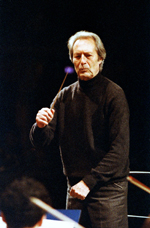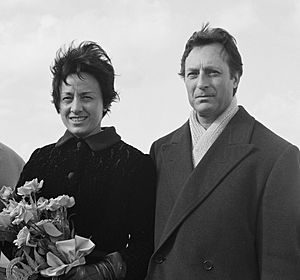Carlo Maria Giulini facts for kids
Quick facts for kids
Carlo Maria Giulini
|
|
|---|---|
 |
|
| Born | 9 May 1914 |
| Died | 14 June 2005 (aged 91) Brescia, Italy
|
| Occupation | Conductor |
| Years active | 1944–1998 (54 years) |
Carlo Maria Giulini (9 May 1914 – 14 June 2005) was a famous Italian conductor. He was known for his calm and serious approach to music. He believed in staying true to the composer's original ideas.
Giulini started playing the violin at age five. When he was 16, he began studying at Italy's top music school, the Conservatorio Santa Cecilia in Rome. He learned to play the viola and also studied conducting. Soon, he joined the Orchestra dell'Accademia Nazionale di Santa Cecilia, a major orchestra in Italy.
Even though he won a conducting competition, he couldn't take the prize right away. He had to join the army during World War II, even though he didn't believe in fighting. After the war, he became a very respected conductor. He led many of the world's best orchestras, like the Chicago Symphony Orchestra and the Vienna Philharmonic. His career lasted 54 years, until he retired in 1998. He passed away in Brescia, Italy, when he was 91 years old.
Contents
Early Life and Music Training
Giulini was born in Barletta, Kingdom of Italy. His father was from Lombardy and his mother from Naples. He grew up in Bolzano, which was part of Austria when he was born. Most people there spoke German, and he heard a lot of Austrian music. He remembered being fascinated by the town band.
For Christmas in 1919, when he was five, Giulini received a violin. He quickly became good at it with help from local teachers. In 1928, a famous Italian violinist named Remy Principe heard Giulini play. Principe invited him to study at the Conservatorio Santa Cecilia in Rome. Giulini started his studies there two years later, at age 16. He learned viola, composition, and conducting.
When he was 18, Giulini joined the Orchestra dell'Accademia Nazionale di Santa Cecilia. This was Italy's most important orchestra at the time. He became a violist to help his family, as money was tight during the Great Depression. He was very happy when he got the job.
He played under many great guest conductors. These included Bruno Walter, Wilhelm Furtwängler, and Richard Strauss. Giulini said he didn't like how some conductors were bossy. But he loved the gentle way Bruno Walter led, making every musician feel important.
A Conductor's Journey
In 1940, Giulini won a conducting competition. The prize was a chance to conduct the St. Cecilia orchestra. But before the concert, he was called into the Italian army. He was sent to fight in Croatia. However, Giulini was a pacifist and against the Fascist government. He chose not to fire his gun at people.
In 1942, during a break, he married Marcella de Girolami. They had been together since 1938 and stayed married for 53 years. In September 1943, Italy signed a peace agreement with the Allies. But the Nazis still occupied Rome. Giulini's commander told his troops to fight with the Nazis. Giulini decided to go into hiding instead. He lived for nine months in a tunnel under his wife's uncle's house. He hid with two friends and a Jewish family. Posters with his face were put up around Rome, saying he should be shot if found.
After the Allies freed Rome on 4 June 1944, Giulini was chosen to lead the Accademia's first concert. He was one of the few conductors who hadn't supported the Fascist government. The concert was on 16 July 1944. He conducted Brahms's Symphony No. 4, which he had studied while in hiding. This piece became the one he conducted most often in his career.
Giulini also worked with the Chamber Orchestra of Rome starting in 1944. He became its music director in 1946. He also worked with the Italian Radio (RAI) Orchestra. He became its main conductor in 1946. Later, he helped start the Milan Radio Orchestra.
Conducting Opera
Giulini conducted his first full opera on stage in 1950 in Bergamo. It was La traviata. The next year, he returned with famous singers Maria Callas and Renata Tebaldi. His work caught the attention of Arturo Toscanini, another great conductor. Toscanini recommended Giulini for a top job at La Scala, a famous opera house.
Giulini became the music director of La Scala in 1953. He conducted 13 productions there. These included operas like L'Italiana in Algeri and La Cenerentola. He also worked with famous producers like Franco Zeffirelli and Luchino Visconti. His La traviata with Maria Callas was very popular.
He left La Scala after five years. He was unhappy when some audience members were disrespectful to Maria Callas. Later, Giulini decided to mostly stop conducting operas. He felt that opera productions often didn't match his artistic vision. He wanted to focus on orchestral music where he had more control. He didn't want to compromise his artistic ideas.
Leading Orchestras
Giulini slowly added more types of music to his performances. He didn't conduct symphonies by Mozart and Beethoven until the 1960s. During the 1960s, many top orchestras around the world wanted him as a guest conductor. He made many popular recordings with the Philharmonia Orchestra of London.
In 1955, he made his first appearance in America with the Chicago Symphony Orchestra. He worked with them for 23 years. He was their Principal Guest Conductor from 1969 to 1972. He also became music director of the Vienna Symphony from 1973 to 1976.
From 1978 to 1984, Giulini was the main conductor and Music Director of the Los Angeles Philharmonic. He started his time there by conducting Beethoven's 9th Symphony. In 1982, he returned to opera briefly. He conducted a highly praised production of Verdi's Falstaff with the Los Angeles Philharmonic.
Many people admired Giulini's conducting style. He was not bossy or overly energetic. Instead, he was a thoughtful musician who showed calm authority. He was deeply dedicated to the music score. His performances were powerful and natural. He brought great depth to the operas of Mozart and Verdi.
Famous Recordings
Giulini made many important recordings. His opera recordings include Mozart's The Marriage of Figaro and Don Giovanni from 1959. He also made a live recording of Verdi's La traviata with Maria Callas in 1955. His recordings of Verdi's Requiem were also highly praised.
Some of his admired orchestral recordings include Debussy's La mer and Dvořák's 9th Symphony with the Philharmonia Orchestra. He also recorded Brahms's 4th Symphony and Mahler's 1st and 9th symphonies with the Chicago Symphony Orchestra. Many of these recordings were for the Deutsche Grammophon label. His live recording of Britten's War Requiem won a Gramophone Award.
Awards and Recognitions
- Gramophone Award
- Grammy Award for Best Choral Performance
- 1981 Mozart: Requiem; Norbert Balatsch (choirmaster) / Philharmonia Orchestra & Chorus
- Grammy Award for Best Classical Album
- Grammy Award for Best Engineered Album, Classical
- Grammy Award for Best Instrumental Soloist Performance
- 1989 Mozart: Piano Concerto No. 23; Vladimir Horowitz / La Scala Orchestra
- Grammy Award for Best Orchestral Performance
- 1972 Mahler: Symphony No. 1 in D; Chicago Symphony
- 1978 Mahler: Symphony No. 9 in D; Chicago Symphony
- Honorary Member of the Royal Academy of Music (1972)
See also
 In Spanish: Carlo Maria Giulini para niños
In Spanish: Carlo Maria Giulini para niños
 | Ernest Everett Just |
 | Mary Jackson |
 | Emmett Chappelle |
 | Marie Maynard Daly |


